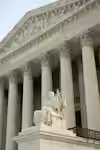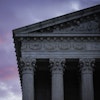Chamber Litigation Center

Fighting for business in the courts
Founded in 1977, the U.S. Chamber Litigation Center fights for business at every level of the U.S. judicial system, on virtually every issue affecting business, including class actions and arbitration, labor and employment, energy and environment, securities and corporate governance, financial regulation, free speech, preemption, government contracts, and criminal law.
Explore the case database
Use advanced search features to view recent activity on the regulatory litigation and amicus briefs the Litigation Center has filed on behalf of the business community.
Featured Story
As federal agencies pursue aggressive policy changes through regulation, the Chamber is leveraging its litigation expertise to address these threats.
Request access to the Litigation Center's newsletter
Request access to exclusive updates about the U.S. Chamber Litigation Center's lawsuits and amicus briefs protecting the American business community.
Leadership


Recent case activity by issue
Latest Content
WASHINGTON, D.C. - Tom Quaadman, executive vice president for Center for Capital Markets Competitiveness, U.S. Chamber of Commerce, released the following statement after today’s Supreme Court ruling on the Consumer Financial Protection Bureau (CFPB):
Discrimination and personal-injury lawsuits, the debate over federal liability protections, the use of liability waivers, and lawsuits against China highlighted this week’s reporting and commentary on COVID-19 litigation. The National Law Review also has an updated and very comprehensive report summarizing “the shifting state, territorial and local government policies and guidance in response to the COVID-19 pandemic and reopening of the economy.”
As Congress continues to debate federal coronavirus liability protections, reopening businesses are increasingly turning to liability waivers to minimize their legal risk.
